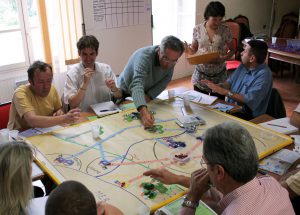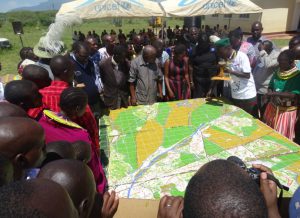Framing the Decision Context and Engaging Stakeholders Effectively
 The core of a successful adaptation process are the decisions that determine the objectives, roles and responsibilities of all involved actors, financial and other resources employed and the ‘energy’ behind an adaptation process. While this framing stage is often underestimated, our PlanAdapt team members believe that it is the most fundamental stage. And success or failure is often decided upon during this early stage. We view each adaptation decision context as a unique combination of risks, capacities, enabling environment, risk tolerance and many other factors that determine decision-making on who will pay, who reaps the benefits of the adaptation measure and other crucial aspects (Olazabal et al. 2024, Nalau et al. 2021).
The core of a successful adaptation process are the decisions that determine the objectives, roles and responsibilities of all involved actors, financial and other resources employed and the ‘energy’ behind an adaptation process. While this framing stage is often underestimated, our PlanAdapt team members believe that it is the most fundamental stage. And success or failure is often decided upon during this early stage. We view each adaptation decision context as a unique combination of risks, capacities, enabling environment, risk tolerance and many other factors that determine decision-making on who will pay, who reaps the benefits of the adaptation measure and other crucial aspects (Olazabal et al. 2024, Nalau et al. 2021).
Context And Power Relations Matter for Decision-Making
When discussing context, policymakers and practitioners nod their heads, all too familiar with the challenge of trying to inform practice or policy with knowledge when their immediate and peripheral surroundings fail to recognize its need or its relevance, and are unwilling to take it into consideration when making decisions. There is a plethora of approaches and tools that help organizations, governments or businesses better decipher the context in which they work and take decisions. PlanAdapt provides its partners with an informed overview and facilitates the application of such approaches and tools (e.g. political economy analysis, power analysis, going beyond context matters, decision mapping, participatory power analysis). By doing so, we support the acting stakeholders in a way that enables effective mechanisms to prepare and take good decisions in view of climate change adaptation.
 Context, power and influence – are often seen as something that is clearly beyond our control, too large, too complex, too “external”. Our assumption is that a more thorough understanding of context should lead to more effective interventions – both by those who design and manage policies and by those trying to influence them – and thus greater impact.
Context, power and influence – are often seen as something that is clearly beyond our control, too large, too complex, too “external”. Our assumption is that a more thorough understanding of context should lead to more effective interventions – both by those who design and manage policies and by those trying to influence them – and thus greater impact.
Engaging Stakeholders Effectively is an Art and Pays Off
It is an uncontested view that every collective decision-making process strongly relies on the way stakeholders participate and take charge of the process. We constantly learn from and with our partners, clients and stakeholders in order to improve the understanding of how to facilitate stakeholder engagement processes best. We keep an eye out for approaches that others have developed and applied, in particular outside of the adaptation community (e.g. partnership brokering). While doing so, we persistently improve and fine-tune our own skills in applying approaches such as participatory scenario planning; transformative scenarios; stretch collaboration; social labs; serious gaming, foresight, design thinking, theory U, co-presencing, open fora, adaptation pathways, participatory modelling.
